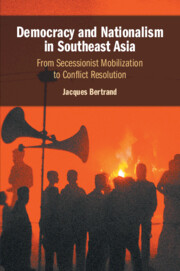‘An illuminating guide to how democratization offers pathways away from the violence of nationalist conflict – and to the many pitfalls along the way. Combining daunting knowledge of Southeast Asian cases with a relentless desire to compare, Bertrand has produced an essential work for specialists of the region, conflict, and nationalism.'
Edward Aspinall - Australian National University
‘This book provides an extremely rich and nuanced comparative analysis of the complex patterns of mobilization and demobilization, conflict and conflict resolution, observed in regions of Southeast Asia hosting longstanding secessionist/nationalist struggles. It constitutes a huge contribution to scholarship on nationalist/secessionist struggles and conflict resolution, democratization, and Southeast Asian politics.'
John T. Sidel - London School of Economics and Political Science
‘Bertrand offers an astute, original, well-supported argument about the shape, trajectory, and relative virulence of nationalist conflicts before, during, and after transitions to democracy. This largely institutional analysis highlights the potential democracy offers, but also the salience of credible commitments, institutional checks, and framing, signaling, and incentives on both sides.'
Meredith L. Weiss - University at Albany, State University of New York
'… Bertrand shows that negotiation is a better way to manage separatist challenges than repression.'
Andrew J. Nathan
Source: Foreign Affairs
‘The book makes a firm contribution to comparative studies in political science and to area studies. Scholars working on democracy, nationalist and ethnic conflicts and those doing institutional analysis will find Democracy and Nationalism in Southeast Asia useful and enlightening. For its deep comparative insights, it should be of particular interest for those in Southeast Asian studies and using qualitative methods. Its rich comparative studies implicitly point to the aridness of large-N analysis, where people and institutions are often lost in the data.’
Meghna Kajla
Source: Journal of Contemporary Asia
‘… a seminal account of how democracy conditions the struggles of minority nations … essential reading for those familiar with Asian politics seeking to understand conflicts, as well as experts on conflict seeking to understand these cases.’
Shane Joshua Barter
Source: Pacific Affairs



